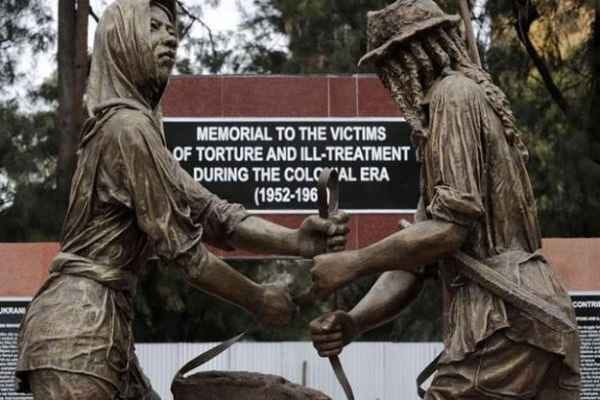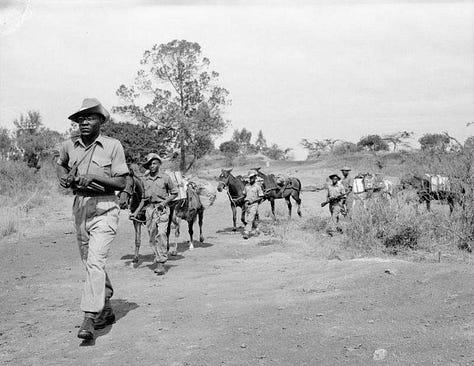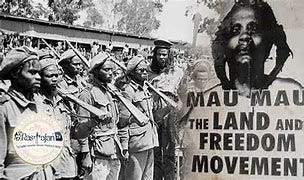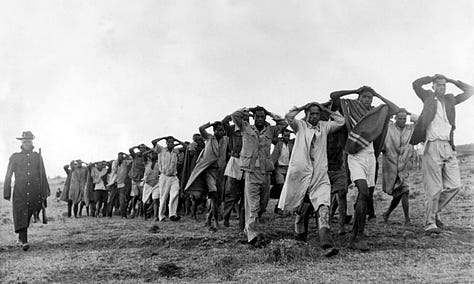Jamhuri Day! Harambee!
Disgraceful truth of British colonial abuse & its concealment. The British Empire is marked by global devastation, exploitation, & the violent history, is something the British prefer to erase.


“Uhuru Gardens National Monument and Museum not only speaks of our pain as a country but also eloquently tells the story of our heroes, academicians, sportsmen and women,” said President Kenyatta
Wishing all Kenyans a joyful Jamhuri Day. May it be a day filled with happiness for everyone.
December 12th is the Jamhuri Day in Kenya’s celebration of its independence and freedom from the British. The Swahili word Jamhuri translates to “republic” in English.
Ukolon”
Ukoloni — “Colonization”
Kenya achieved independence from British rule on December 12, 1963, and was proclaimed a republic one year later, following eight decades of colonial administration.
The initial colonization of Kenya was by the Germans; however, in the 1890s, British colonists arrived to assumed control of the occupied territory and exploiting the resources. By 1920, Britain had officially established a colony in Kenya.
The fight for independence in Kenya included diverse forms of resistance to colonial domination, with the Mau Mau uprising being a critical element.
The violent acts and atrocities committed during British colonial rule profoundly impacted the lives of countless Kenyans.
Labour Chancellor of the Exchequer, Gordon Brown, declared in Tanzania, "Britain's unmatched record of imperial conquest and rule... The time has long passed for Britain to apologize for its colonial history."
The British government and King Charles have formally acknowledged historical injustices, leading some victims of violence to initiate legal proceedings against the British government for these offenses.
Public statements by King Charles and former British Foreign Secretary William Hague have acknowledged the torture and mistreatment of Kenyans during the colonial period.
The statements do not constitute a full apology. What is often overlooked is the extent to which the British imperial government attempted to conceal these wrongdoings.
Individuals, corporations, and institutions benefiting from the legacy of Britain's historical violence often seem indifferent or unresponsive to calls for recognition, apology, and reparations.
The Mau Mau uprising began in 1952 under the leadership of Dedan Kimathi, who was later executed. This marked the start of a turbulent decade across Kenya.
In 1952, the proclamation of a state of emergency resulted in the enactment of extraordinary regulations akin to wartime powers.
The regulations resulted in widespread arrests, detentions without trial, a high incidence of capital punishment, summary executions, evictions, fines, and the forced relocation of entire villages, as well as ethnic cleansing through the allocation of fertile lands to colonial white settlers.
One may draw parallels between the historical occupation of Kenya and the current situation in Palestine, which is characterized by the 75 yeas of occupation by Zionist Israel of Palestine with the ongoing genocide, ethnic cleansing, and apartheid policies.
Between 1953 and 1960, estimates suggest that 70,000 to 150,000 Mau Mau freedom fighters were imprisoned and subjected to torture without trial in a series of camps.
The conditions in these camps were appalling, with British colonial authorities and white settlers inflicting violence without any accountability, similar to what is observed in the West Bank.
The Kenya Human Rights Commission estimates that over 100,000 Kenyans were killed, tortured, and maimed during this period. The colonial attorney general of Kenya advised, "If we are going to sin, we must sin quietly."
The Kenyan Flag represents the nation's struggles and the scars of the liberation war. The shield and spears depicted on the flag symbolize the triumph achieved.
Even after achieving independence, adopting a national flag, and establishing a national anthem, the Queen of England remained the Head of State of Kenya for an entire year.
This implies that while Kenyans had achieved freedom, it was not complete. On December 12, 1964, the Queen of England relinquished her role as Head of State, signifying Kenya's shift to a republic.
History offers invaluable insights and context for the present, demonstrating how the colonial imperialist mindset of European nations endures within institutions like the IMF, World Bank, and United Nations, where veto power resides with former white colonial powers.
It serves as a lasting reminder of the atrocities of slavery and colonialism, ensuring that we must never forget, even in the acts of forgiveness or reconciliation, nor should we attempt to rewrite history.
Kenyans ought to heed the words of their Founding Father: "We shall forgive, but we shall NEVER forget." Forgiving those who have wronged us is crucial, yet it is equally important to always remember their names.
Recognizing and educating high school students about the brutalities of British colonial history is essential for our generations.
The widespread atrocities against humanity and the severity of British colonial rule spanned from North America and the Pacific, across Asia to Africa, and over the Atlantic, enveloping the world under the Union Jack.
10 Atrocities Committed by the British Empire that They Would Like to Erase from History Books



Langata Concentration Camp (LLC)
During the liberation war, LLC (Nazi) concentration camp gained infamy for imprisoning valiant freedom fighters.
One and a half million people were detained/slaved in camps or villages fortified by British forces, which bore signs declaring, "Labor and Freedom."
Torture and mass executions were common, including men being anally raped with bottles and other devices by guards. Regrettably, the majority did not endure the colonizer's brutality.
Some freedom fighters were dragged by military vehicles until their bodies broke into pieces. Others were mauled by guard dogs before being executed.
Historical accounts have drawn comparisons between Langata Camp and the Nazi camps in Germany, noting similarities in psychological tactics and severe methods torture.
It has been reported that the Queen characterized the Mau Mau uprising as a type of mental illness, proposing that the insurgents be detained in mental institutions, which were compared to concentration camps.
The Queen and the British government faced accusations of supporting the creation of large detention centers where 'shock therapy' and torture were allegedly administered as 'treatment.'
To all Kenyans I wish you a Merry Christmas and a Prosperous New Year to you all.
As we move to the New Year, 2025, I leave you with the words of Founding President of Kenya Jomo Kenyatta
“…I urged our good men and women to be of service to their compatriots…let everyone who is educated, teach others to read and write. Let every man who is healthy help a man who is sick. Let every man who has work find some prospect for a man that is poor and not employed. Let service be our inspiration for the future…”
